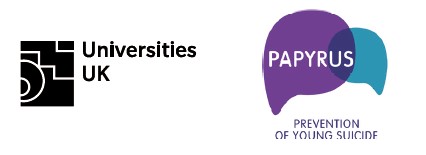Talking about suicide: A guide for college and university staff

Trigger warning: these pages include content discussing suicidal feelings and self-harm
Many staff in colleges and universities have concerns about student suicide. They don’t always feel they have the knowledge, skills or confidence to respond.
This guide aims to help staff across universities have a better understanding of suicide and self harm. It is not meant as an alternative to assessment of risk by a trained professional, but to help people make decisions on how best to support someone they are concerned may be at risk of suicide or self-harm.
We hope it will build confidence in the whole university community to talk openly about suicide, know what to do in any given situation and help to keep everyone safe in challenging times.
Read more below or download or order a copy of the booklet Talking about suicide:
Related articles
How is suicide different from self-injury or self-harm?
Suicidal feelings – when should you be worried about a student?
What makes suicide more, or less, likely?
What to do if you are worried about a student
When a student confirms they are at risk of suicide
Supporting students after the initial crisis
Suicide and self-harm
Lack of understanding can create fear around suicide and self-injury and, sometimes, there is confusion between the two. It can be helpful to understand the difference, so you know how best to support a student.
How is suicide different from self-injury or self-harm?
Suicidal feelings – when should you be worried about a student?
It is not always possible to tell that a person is contemplating suicide, and sometimes of people will give no indication. However, it is very important to be aware of the potential signs and the type of language people may use if they are feeling suicidal.
Students with suicidal feelings
What makes a suicide more, or less, likely?
Being aware of these factors which may make someone more, or less, likely to act on suicidal thoughts can be useful. It will give you a better chance of understanding a person’s situation and may mean you are able to support them or signpost them to appropriate help.
Read about risk factors and protective factors
What to do if you are worried that a student might be at risk of suicide
Knowing what to do if you have concerns that a student might be at risk of suicide is very important. It can give you the confidence to take action which may help.
What to do if you are worried about a student
What to do if you are with a student who has confirmed they are at risk of suicide
When a student does not feel they can keep themselves safe, and an appointment with support services is not going to be timely or sufficient, it is time to step up to the crisis action plan.
When a student confirms they are at risk of suicide
Supporting students after the initial crisis
Once a student has been identified as being at risk of suicide it is good to have a follow-up plan to ensure the crisis is averted and the student has adequate support for their mental health.
Supporting students after the initial crisis
What to do in the unfortunate event of a suicide
If a suicide or suspected suicide occurs within the university community, it can be an extremely distressing and confusing time for staff and students alike. It helps to have a plan that can be acted on straight away.
What to do if a suicide takes place
Giving everyone the confidence to talk about suicide
To reduce the stigma of mental health issues colleges and universities should have a policy where talking about mental health is everyone’s responsibility and helping to protect a student who is suicidal is part of that.
Resources and sources of support
CAMPAIGN AGAINST LIVING MISERABLY (CALM)
Support, information and signposting anywhere in the UK via webchat or phone.
Call: 0800 58 58 58 (5pm-midnight, 365 days a year)
Online: thecalmzone.net
PAPYRUS
Papyrus is the national charity dedicated to the prevention of young suicide.
For confidential suicide prevention advice contact HOPELINEUK, 9am-midnight, every day.
Call: 0800 068 4141
Text: 07860 039967
Email: pat@papyrus-uk.org
Samaritans offers listening and support to people and communities in times of need.
Available to listen 24 hours a day, 365 days a yearCall: 116 123 (free line)
Email: jo@samaritans.org
Online: samaritans.org
24/7 text service, for anyone in crisis anytime, anywhere
Text: SHOUT to 85258
This content has been adapted from “Talking about suicide: A guide for college staff" originally developed as a partnership between the Association of Colleges and the Charlie Waller Trust and has been endorsed by Universities UK and Papyrus. It was written by members of the Charlie Waller team who are experts in the field – Dr Andrew Reeves, Kirsten Amis, Kath Caffrey – and reviewed by Prof. Keith Hawton at the Centre for Suicide Research.



Resources
Was this article helpful?
Your feedback helps us create better content so if this article helped, please leave a like below and let others know.
The Charlie Waller Trust
The Charlie Waller Trust is a registered charity in England and Wales 1109984. A company limited by guarantee. Registered company in England and Wales 5447902. Registered address: The Charlie Waller Trust, First Floor, 23 Kingfisher Court, Newbury, Berkshire, RG14 5SJ.
Copyright © 2024 The Charlie Waller Trust. All rights reserved.


